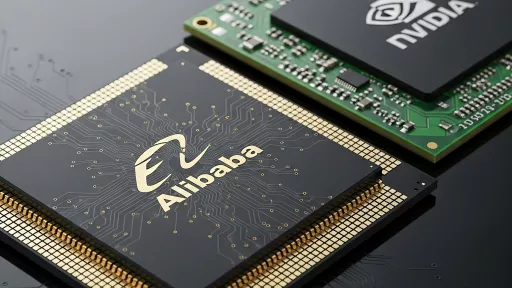Alibaba’s semiconductor division, T-Head, has unveiled a new AI processor that it claims can rival Nvidia’s H20 GPU, a specialized chip for the Chinese market currently affected by geopolitical restrictions.
The demonstration aired on China Central Television (CCTV) on September 16, coinciding with Premier Li Qiang’s visit to China Unicom’s Sanjiangyuan Energy Intelligent Computing Centre in Qinghai. During the broadcast, Alibaba’s new PPU accelerator was shown alongside Nvidia’s H20 and A800, as well as Huawei’s Ascend 910B, with a performance chart suggesting parity between Alibaba and Nvidia hardware.
Key Specs Highlighted
According to on-screen graphics reported by the South China Morning Post, the Alibaba PPU features:
- 96 GB of HBM2e memory
- 700 GB/s chip-to-chip interconnect
- PCIe support
- 400 W board power
While the demonstration did not detail the testing methodology or provide raw performance data, it marks the first public comparison placing Alibaba’s chip in the same category as Nvidia’s datacenter GPUs.
Deployment at Scale
Reuters reports that China Unicom has already installed 16,384 of Alibaba’s PPU cards, representing over half of the roughly 23,000 domestic accelerators at the Qinghai site. Combined, these cards deliver 3,579 petaflops of compute, with the facility expected to exceed 20,000 petaflops once fully scaled.
Geopolitical and Technical Context
The demonstration carries significant geopolitical undertones. Nvidia’s H20, built on Hopper architecture, complies with U.S. export restrictions limiting high-performance silicon sales to China. The H20 ships with 96 GB of HBM3 memory and about 4.0 TB/s memory bandwidth, providing a benchmark for evaluating Alibaba’s PPU, which matches the HBM capacity but uses slightly different memory technology.
The Software Question
Technical performance is only part of the equation. Alibaba has not shared details about frameworks, developer toolchains, or compatibility with existing AI model stacks. Without independent benchmarks or broad developer adoption, claims of parity with Nvidia remain largely unverified outside of state-backed demonstrations.
In short, Alibaba is positioning itself as a domestic alternative to Nvidia for AI acceleration, but the full picture—including real-world performance and software support—is still emerging.

